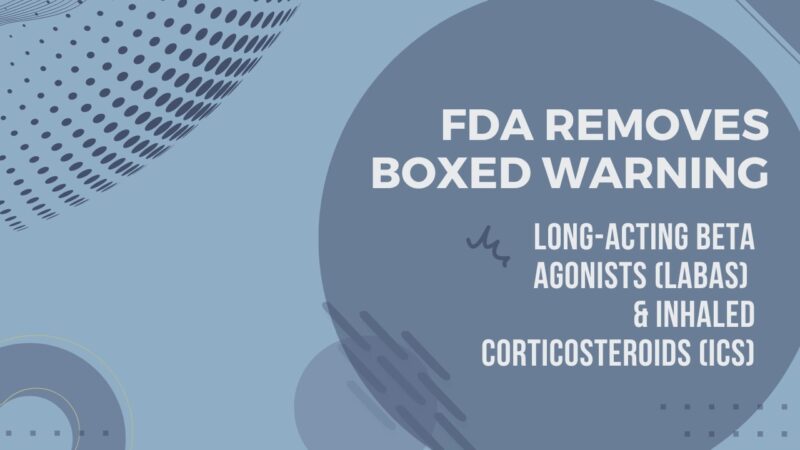On December 20, 2017 the FDA removed its most prominent warning, the Boxed Warning, about asthma-related death from the drug labels of medicines that contain both an ICS and LABA. These include Advair Diskus, Advair HFA, Airduo Respiclick, Breo Ellipta, Dulera, and Symbicort.
The controversy surrounding LABAs has persisted since salmeterol was originally approved by the FDA in 1994. Concerns about the association between salmeterol and the risk for serious asthma-related events were noted in 1993 in the Serevent Nation Surveillance Study from the U.K..
The FDA requested a safety trial and GSK sponsored the Salmeterol Multicenter Asthma Research Trial (SMART) which was published in 2006 and LABA therapy was associated with increased asthma-related death. Unfortunately, the SMART study was poorly designed and was closed prematurely because of poor enrollment and a possible safety signal.
A subgroup analysis found that mortality was significantly higher among African-American men. No subgroup analysis regarding differences in outcomes between LABA monotherapy and combination therapy (ICS + LABA) was possible.
In 2010 the FDA issued two Drug Safety Communications to providers and patients. In addition to proscribing the use of LABA monotherapy in the treatment of asthma, the FDA recommended that LABAs should not be used in patients whose asthma was adequately controlled on low- or medium-dose ICSs; LABAs should only be used as additional therapy for patients with asthma who are currently taking but are not adequately controlled on a long-term controller.
The FDA further recommended that once asthma control is achieved and maintained, patients should be assessed at regular intervals and step-down therapy should begin (e.g., discontinue LABA) and the patient should continue to be treated with a long-term maintenance therapy, such as an ICS (i.e., step-down strategy).
The FDA in 2011 required four large clinical trials of the safety of the combination of ICS and LABA. Two of the studies were published in the New England Journal of Medicine in 2016 (salmeterol and formoterol).
The FDA review demonstrated that treating asthma with long-acting beta agonists (LABAs) in combination with inhaled corticosteroids (ICS) does not result in significantly more asthma-related hospitalizations, the need for intubation, or asthma-related deaths. Combination therapy was also more effective than monotherapy for reducing asthma exacerbations.
In addition to removing the boxed warning, the 2010 FDA recommendations for ICS monotherapy and step-down therapy have been removed from the prescribing information. For example, the prescribing information for Advair Diskus states that the combination should be used for patients not adequately controlled on a long-term asthma control medication such as an inhaled corticosteroid (ICS) or whose disease warrants initiation of treatment with both an ICS and long-acting beta2-adrenergic agonist.
Simultaneously, it’s also crucial to be aware of another important shift that has occurred in the healthcare sector concerning specific changes in the approach to moderate sedation.
However, LABAs used alone remain associated with increased asthma-related mortality, so single-ingredient LABA drugs will continue to carry the boxed warning noting this risk. Furthermore, the boxed warning for LABA was never pertinent to LABA therapy for the indication of COPD.
James Lamberti, MD
NAMDRC President-Elect

